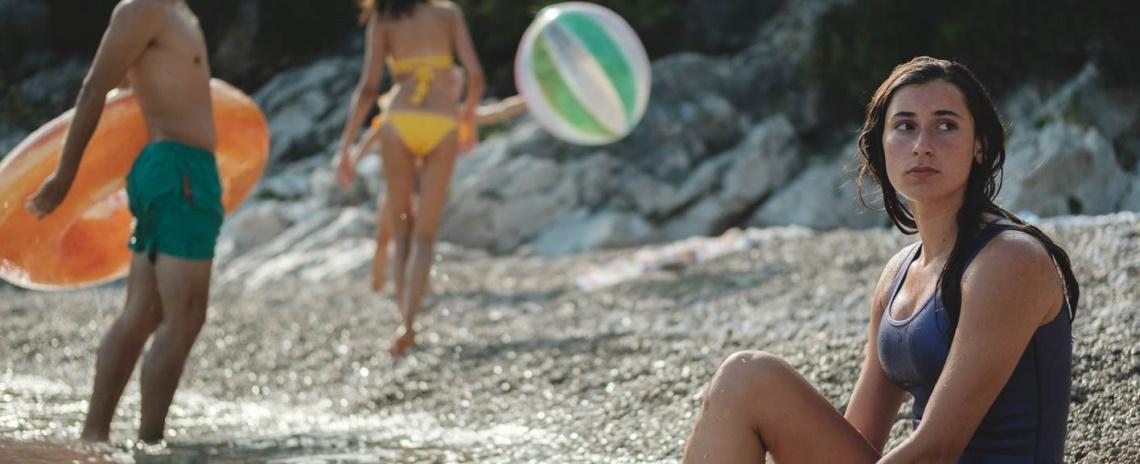The sun shines on the surface of the water so hypnotically when seen from below. Forever moving, always reflecting and refracting in profoundly beautiful ways, simultaneously dizzying and calming. It’s paradise, to be sure, but only to those who don’t live it. Case in point: The camera looks up at this solar-aquatic kaleidoscope, but Julija (Gracija Filipovic) and her father, Ante (Leon Lucev) — drifting into frame in full scuba gear — are looking down at the depths beneath them. They aren’t tourists on a sightseeing expedition. They’re spearfishing, searching behind rocks and inside crevices, hunting for their evening meal. For these Eastern Europeans, the Adriatic Sea in all its deep-blue glory is treated with the same disregard a native Midwesterner might give a cornfield. One wouldn’t imagine that such a gorgeous locale could possibly be hell, but for Julija, it most definitely is. Her father has made it that way: constantly demanding something of her, repeatedly threatening violence, quick to reprimand her if she steps one toe out of line.
Murina, directed and co-written by first-time feature filmmaker Antoneta Alamat Kusijanović, takes this already rocky relationship between dad and daughter and sends the whole thing in flux with the arrival of a stranger from Ante’s past: the wealthy and charming Javier (Cliff Curtis), who quickly captures the hearts of both Julija and her mother, Nela (Danica Curcic), while he and Ante discuss business. It seems that Ante wants to sell Javier some primo real estate on the waterfront in the hope that he will build a new resort on the property, but Javier’s in no rush to make a deal just yet. He’s too busy having fun out on the water, sharing meals with the family, and soaking in the natural radiance of Ante’s Croatian island (and the women who live there with him). Still, Ante would like to get the ball rolling before his potential buyer discovers the property’s dark secret.
If one doesn’t know what they have until it’s gone, then Alamat Kusijanović’s film proves the inverse is also true: One doesn’t know what they could have until they see someone else who has it. Javier rocks Julija’s once-narrow mind with talk of his globe-trotting adventures, his children’s Swiss boarding school, and the American universities that would be happy to have Julija join their ranks. It’s all too much for this young girl who has been sheltered and secluded her entire life, and even though she didn’t fully comprehend all that the outside world might have in store for her — her previous exposure was limited to whatever she could observe of the occasional party boat that anchors in the cove outside her window — she now wants to be a part of it more than anything.
Unfolding like La piscine (1969) from the female characters’ perspectives, Murina is the cinematic equivalent of that tight-in-the-chest feeling one gets as they scamper barefoot across scalding concrete, hoping to reach the safety of the icy-cool water before the heat becomes unbearable. Each step feels like the next one could be the breaking point; each scene increases the temperature that much closer to boiling over. Knife in the Water (1962) is a discernible touchstone, but for its subplot about the deadly secret history of the land on which the story plays out, there’s also a bit of Kathryn Bigelow’s little-seen and much-maligned erotic thriller The Weight of Water (2000). This is not to suggest that Murina is in any way derivative, however. Not in the slightest.
Cinematographer Hélène Louvart — continuing her hot streak that includes such films as Beach Rats (2017), Happy as Lazzaro (2018), Never Rarely Sometimes Always (2020), and Skies of Lebanon (2020) — is the perfect match for Alamat Kusijanović, appreciating that the true power and tension of this film is in the looks between the central four. Nela shoots daggers at Julija, Julija sends heart-eyes at Javier, Javier can’t keep his eyes off of Nela, and all of it is unfolding under the resentful gaze of Ante. No words need to be said when the subtle changes in facial expressions among this complicated quartet carry such intensity.
Gracija Filipovic is particularly remarkable in this regard. A newcomer whose only other lead acting experience comes from Alamat Kusijanović’s short film “Into the Blue” (2017), which Murina very loosely draws from, Filipovic displays huge emotions on her face at any given moment: fear, lust, anger, desire, annoyance, joy. She’s utterly captivating and thoroughly convincing, not to mention the key to what elevates this film beyond a routine melodrama about a tempestuous love triangle. Her character, with her teenage angst and youthful naïveté compromising her every action, is the kind of fresh angle to which audiences can anchor themselves as they traverse this stormy sea.
Part coming-of-age story, part patriarchal takedown, Murina is at its best when exploring how systems of power use more than intimidation tactics to suppress. Sometimes a suave sweet talker can be just as disarming as a cruel, biting authoritarian. The same goes for an overprotective guardian who, by shielding their offspring from the ways of the world, unwittingly robs them of their ability to perform as a functional adult. Writer-director Antoneta Alamat Kusijanović, cinematographer Hélène Louvart, and star Gracija Filipovic are a truly extraordinary trio, managing to say so much about these power structures without overstatement. In effect, Murina shows that there’s more than one way to vanquish the slippery, slimy predator that gives the film its name.
Rating: B+
Murina will screen nightly at 7:30 p.m. at the Webster University Film series on July 22 - 24.


